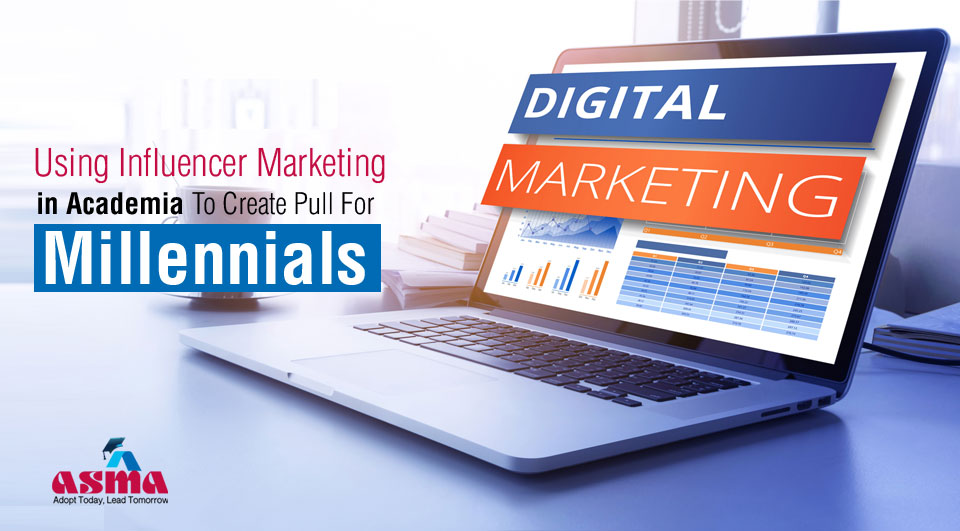Using Influencer Marketing in Academia To Create Pull For Millennials
When we think of Millennials, we think of massive influence of Information and Communications Technology (ICT) in their daily lives. By virtue of being born in an age of communication revolution, rapid changes in ICT have drastically re-engineered their inner/mental wiring. As a result, this new Generation characterizes a very different outlook about the way things are perceived. For them, experience is prime and sometimes even more important than the product itself. While advancement in communication technology is empowering the young generation by making them well informed, it is also fuelling their demand for seeking qualitative information. The flip side of technology revolution is that it is reducing the attention span of young students.
For educational institutions, implications of this emerging trend have direct impact on their marketing campaigns as service providers. They now need to connect with this new generation with more engaging and credible content to arrest their attention. All this is in effect is escalating competition among top tier Institutions for winning attention of its prospective buyers. Reaching out to them through traditional marketing tools like advertising (mass) is proving to be ineffective. So, the all-important question remains – how do you target a consumer segment that is going to have the highest spending power by 2018.
In such a scenario, customer relationship management becomes the main underpinning where “human mind” itself is the biggest consumer and “experience” – the product. Thus, academic institutions need a potent marketing strategy that is participative and engaging and allows its consumers to try/experience their brand/service. To tackle this, influencer marketing could be a groundbreaking solution to market educational programs through innovative engagement and brand authentication by people who can affect public opinion.
Who Are Millennials?
As per a survey report by Goldman Sachs on Millennials, people born between the period 1980 to 2000 are called Millennials. They are the first generation of people to be born in a globalized economy with a flat world. Familiarity with modern technology is radically shaping their experiences and behavior. Not only is this generation always hooked on to the digital media for social networking but also when it comes to career choices, this young population often relies on digital and social media for authentic information.
What is Influencer Marketing?
So what is influencer marketing? Is it having anyone or everyone who can create buzz about your educational brand on social media? No, not exactly. In its simplest form, influencer marketing is a sort of public relations exercise through word of mouth endorsement in the digital age. Using social media influencers in your marketing is the practice of building relationships with the people who can build relationships for you. As such, influencer marketing is based on a person who can generate curiosity in your brand and engage your target audience with the right kind of message. Influencer marketing is useful for multiple purposes of reaching out to the desired target group depending upon your campaign objectives – whether it is to generate leads for driving admissions or building institutional network or simply create brand awareness.
Who are the best Social Media Influencers in Academia?
In the age of digital media young aspirants look out for more and more trustworthy sources and genuine recommendations online to build confidence in your brand. To generate interest in course offerings, educational institutions can create a fleet of influencers for the virtual world. These can be your key faculty members, recruiters, industry guests, current students, parents, staff members etc. Other value-added influencers could include your professional advisers, recognized bodies, mainstream media persons, members of the governing board, educational experts and opinion makers and so on. Among them the best lot could be the ones having serious presence on key social media properties with a strong follower base.
Institutes can then use these Social Media Influencers for testimonial advertising where they play the role of a social influencer who can build relationships with your external audience primarily with prospective applicants. An influencer can reach out to the admission aspirants or any other stakeholder via their blogs and other social networks. You may encourage industry guests and other visitors to the campus to flash more and more twitter mentions about their experiences with your educational brand. The aim is to build an influencer community for amplifying your brand affinity.
Credibility of source is very important in Influencer Marketing. Your target audience will be inspired to form a positive image about your College only when they hear from someone with a recognized expertise or influence in a particular field talking about your academic brand.
The Way Forward
Influencer Marketing can be done in two ways – either by paying for it, or by earning a credible reputation over a period of time. Your marketing strategy should be a mix of both. While paid marketing should be taken up on need basis such as a seasonal campaign, it is the earned influencer marketing which will create long term equity for the brand. Earned influencer marketing happens when influencers promote content about you in which they find some value for personal development. It is normally a cause and effect relationship with the influencer which is based on institutional goodwill.
Right influencers with the right content can make millennial audience take note of you. The need of the hour for education marketers is to create realistic and sticky content for this age group. But before hunting for people who can do so, you should first focus on understanding key attributes of your target audience. This will eventually help you to find right influencers who can create captivating content for your brand, and become your social mouthpiece turning into your credible brand endorsers.




